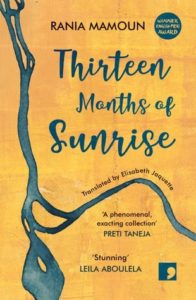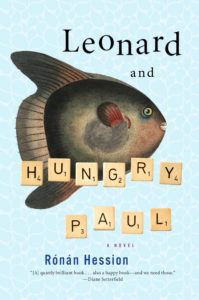
The Quest for Kindness is One of Fiction's Great Challenges
Rónán Hession on Capturing Small Moments of Empathy
In my debut novel, Leonard and Hungry Paul, two gentle young men try to find the balance between engaging with the world and becoming overwhelmed by it. It is a novel about friendship, family, kindness and, above all, the contributions quiet people make to society.
Subjects like kindness and empathy are difficult to write about. As concepts they are over-marketed, and as virtues, under-practiced, at least in a public way. In theory, kindness and empathy are based on recognizing our shared humanity and acting accordingly. In truth, we are often confused about how to apply such principles in real life. How do you avoid becoming a doormat? Don’t we owe it to ourselves to challenge wrongdoing in society? Isn’t empathy a free pass for bad people?
These are not yes/no questions, and Leonard and Hungry Paul is not a novel that promotes unthinking positivity—as Leonard observes: “the true tale of history is worryingly short of comeuppance.” Life, in other words, has a track record of not being fair, and people these days are in no mood to pretend otherwise.
We need to be able to write at the ragged edge of the narrative, where human inconsistency leaves the reader without easy choices.
Leonard and Hungry Paul is, however, an all-in bet on sincerity. The characters do care about each other, and though full of uncertainty, they stand for something. Kind people can and do change the world: not by hammering it into a shape of their liking, but by finding something they can do, however small, and offering it to others.
When I was editing the novel, I came across a news story about a dental technician in Dublin, where I live. Once a week he would show up at the landmark General Post Office—a congregation point for homeless people—and offer to take impressions of their gums. He would then return a week later with a free set of dentures. He had been doing this for years. These special people are everywhere and often overlooked.
Throughout my life, I’ve been lucky to come into contact with kind people and, in many ways, this novel is a tribute to them and their example. I am not naturally kind myself: I see the value of it, but it’s just so much work. I am improving, though, partly thanks to a decade’s worth of experience as a parent, but writing helps too. It has forced me to deconstruct the complex mindsets and habits of kind people.
From a distance, happiness and goodness may look simple and vanilla. But writing this book has taught me that there is plenty to learn from happy families, though it does require a different way of looking. The story needs to be slowed down, the signposts removed, and the space created for human nature itself to be foregrounded.
Working on the novel also led me to reflect on the role that empathy plays in writing. Does reading and writing make a person more empathetic, or are naturally empathetic people more likely to be drawn towards books? Is empathy intrinsic to the reading experience?
In a recent interview to launch her excellent new novel Holiday Heart, translated by Charlie Coombe, Colombian writer Margarita Garcia Robayo was asked about deliberately writing unlikeable characters, and whether readers might feel less empathy for them. Her answer was that it only troubled her if it impeded the reader’s comprehension. Perhaps, then, we are less interested in understanding characters we don’t like, especially if it’s easier and more self-affirming to judge them instead.
Whenever I read about dehumanized characters, I am reminded that they can only say and do what the writer gives them—they are blameless.
I am wary of the idea that writers should permit the idea of likeability to encroach on their drawing of characters, lest we end up like professional wrestling, with novels playing out as a pantomime between Faces and Heels. We need to be able to write at the ragged edge of the narrative, where human inconsistency leaves the reader without easy choices, where we can present a character’s failings without negating their underlying humanity.
There are various go-to choices for dehumanized characters: the greedy banker, the corrupt politician, the wicked stepmother. Whenever I read characters like that, I am reminded that they can only say and do what the writer gives them—they are blameless. The writer’s contempt is too obviously theirs, and therefore, not mine. And so, if empathy is to be applied anywhere in the creative process it is perhaps between the writer and the imaginary people they create.
Empathetic writing does not mean automatically granting characters (or the people they are based on) forgiveness, justification, or absolution; it can still be angry and provocative. But it does mean that we, as writers, must put our own humanity on the table too. What we understand of them, we understand and recognize in ourselves.
Thankfully there are many examples of gifted writers from whom we can learn:

Thirteen Months of Sunrise by Rania Mamoun, translated by Elisabeth Jacquette
This collection of short stories from Sudan includes many moments of intimacy. It captures the plight of the individual, of society, and of the individual in society. Its narrative voice is subtle and accommodating, creating space for us to act as witness to the characters and daily life on the streets of Khartoum.

Child of Fortune by Yuko Tsushima, translated by Geraldine Harcourt
Translator Geraldine Harcourt sadly passed away last year, but her legacy includes bringing her warm and sensitive translations of the work of Yuko Tsushima to a wider English language readership. In Child of Fortune, we get a very flawed and human, yet humane, account of the life of a struggling single mother in Japan. It is an honest portrait of the loneliness and vulnerability of lone parents, of whom society expects so much but does so little to support.

Kitchen by Banana Yoshimoto, translated by Megan Backus
In this zesty debut we get a novel about youthful grief: that sweet sadness which characterises so much of Banana Yoshimoto’s writing. A young woman recovers from the loss of her beloved grandmother by sharing her life with a friend and his transgender mother. It is a novel in which the weight of sadness finds a peaceful coexistence with love and friendship, and indeed acceptance.
__________________________________

Rónán Hession’s debut novel Leonard and Hungry Paul is available now.
Rónán Hession
Rónán Hession is an Irish writer, musician, and social worker based in Dublin. As Mumblin’Deaf Ro, he has released three albums of songs, and his most recent album, Dictionary Crimes, was nominated for the Choice Music Prize for album of the year. Leonard and Hungry Paul is his first novel, and was shortlisted for an Irish Book of the Year award.



















